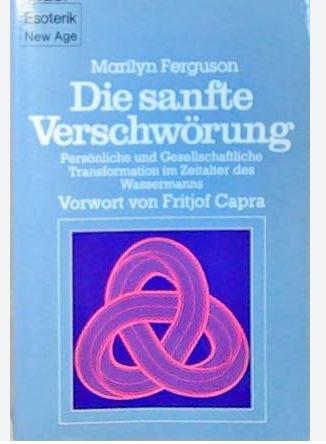
"The Soft Conspiracy" is a book by Marilyn Ferguson, an American author and pioneer of the New Age movement. First published in 1980, the work explores a variety of themes popular in the New Age and esoteric movements at the time. It focuses in particular on shifts in consciousness, social transformations, and the idea that profound changes are taking place in society, albeit not always obvious.
Content of "The Soft Conspiracy":
Marilyn Ferguson uses the term "soft conspiracy" not in the classic sense of a secret, malevolent conspiracy, but as a metaphorical term for the emerging, widespread social, cultural, and spiritual changes that have taken place in Western societies and that have challenged traditional worldviews.
Ferguson describes a "soft revolution" characterized by a growing interest in alternative ways of thinking, holistic medicine, spiritual awakening, and new scientific discoveries. These changes were not implemented through aggressive or intrusive methods, but rather through the quiet spread of new ideas and the gradual adoption of alternative perspectives that would transform the worldview of individuals and societies.
Core ideas and themes of the book:
Expansion of consciousness: Ferguson describes how people are increasingly interested in expanding their consciousness. This includes everything from meditation and spiritual growth to an interest in alternative healing methods and holistic thinking.
Social transformation: The "soft conspiracy" also refers to the social and cultural changes of the time, particularly in the 1960s and 1970s, which manifested themselves in a growing interest in peace, environmental protection, and alternative lifestyles. Ferguson argues that society is moving in a direction with a greater focus on holistic health, spiritual development, and individual freedom.
Hidden Forces: A central theme in the book is the idea that these changes—the new, emerging worldview—are often not driven by clear, obvious leadership or aggressive action, but rather quietly and gently take hold through shifts in society's values and beliefs. She sees this "soft conspiracy" as a form of transformation that proceeds without the usual resistance from institutions or political structures.
Unity of Science and Spirituality: Ferguson also explores the growing connection between science and spirituality, particularly in the way scientists in fields such as quantum physics and neuroscience are increasingly investigating topics related to spiritual or transcendent experiences.
Individual and Society: The idea of a "soft conspiracy" also suggests that changes occur not only through external events, but primarily through the individual awakening and personal transformation of each individual. Change at the societal level is therefore the result of many individual transformations.
Influence and Significance:
The book "The Gentle Conspiracy" had a major impact on the New Age movement of the 1980s and helped popularize the idea that spiritual growth and personal change can also lead to broader societal transformation. Ferguson argues that these profound changes in society tend to occur "gently" and gradually, and that they are not associated with the harshness and aggressiveness of conventional revolutions.
The concept of the "gentle conspiracy" refers to the way in which new ideas and movements can quietly develop and spread in the background without emerging in a dramatic or revolutionary way. It is a revolution of consciousness that gradually changes the social structure and values of society.
Criticism and Reception:
Some critics and readers have found the book too idealistic or too opaque, as it is difficult to define exactly what is meant by the "gentle conspiracy" and how it is supposed to work in society. Nevertheless, it is considered a significant work within the New Age movement, offering a new perspective on spiritual and social change.
Conclusion:
Marilyn Ferguson's "The Gentle Conspiracy" is a groundbreaking book that explores the changes in consciousness and society in the late 20th century.
It explores how spiritual and social transformations occur in a quiet yet profound way and how these changes can ultimately lead to a new perspective on life and the world. Ferguson emphasizes the power of personal and collective transformation, which occurs not through violence or conflict, but through shifts in consciousness and new ideas.

